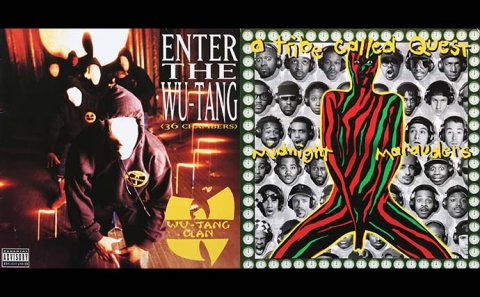
The year was 1993. It had been twenty years since Kool Herc partied at 1520 Sedgwick Avenue and it was clear a presumed ‘moment’ was, in fact, a movement. Hiphop was vibrant, dynamic and only getting bigger and better. Dr. Dre was a top ten best-selling artist with his 1992 multi-platinum solo debut The Chronic. Hiphop was shining on film from Chris Rock and Nelson George’s CB4 to the Hughes Brothers-directed Menace II Society. The releases were mounting with new music from Heavy D, Brand Nubian, Digable Planets, 2Pac, Ice Cube, Naughty by Nature, Run-D.M.C., Onyx, The Roots, MC Lyte, Cypress Hill, Salt-N-Pepa, and Eazy-E, to name a few. Then, to add fuel to the fire, on November 9th, the world experienced not one, but TWO, classic albums for the first time. Queens-bred A Tribe Called Quest dropped their third studio album, Midnight Marauders, while the Staten Island-reppin’ Wu-Tang Clan introduced themselves with their debut album, Enter the Wu-Tang (36 Chambers). As they embody different aspects of the sonic and stylistic landscape, Midnight Marauders and Enter the Wu-Tang (36 Chambers) represent the beauty and vast creativity hiphop has to offer. Both albums would go on become critically acclaimed platinum-selling records as well as, for some, living relics during a time of transformation and the punctuation mark to an era.
In the words of Questlove:
“Classic hiphop is a sentence. And if the beginning of the sentence is me purchasing Eric B. and Rakim’s Paid in Full at Crazy Eddie’s in 1987, then these two records are the end of the sentence. A year before them, Dr. Dre’s The Chronic had changed everything. It had forced credible artists to consider commerce, which was then taken to an even higher altitude when Puffy and Biggie made Ready to Die. And something changed when commerce arrived. Good and bad stopped mattering; only effective and ineffective mattered. Whether a record worked on an audience became the standard, rather than whether or not it was any good. I consider these two albums the last pure, unadulterated moments in the genre. That’s not to say that hiphop hasn’t offered anything of substance since, of course. There have been plenty of classic records. But these two were the end of innocence, and they came at such a great moment.” (Mo’ Meta Blues: The World According to Questlove 112-113)
Read Tribe’s cover story for The Source No. 51 (Dec. ’93) and check out Wu-Tang’s feature in The Source No. 52 (Jan. ’94) from the original copies in the HARI Collection below:
